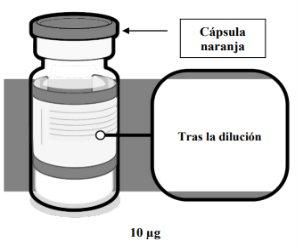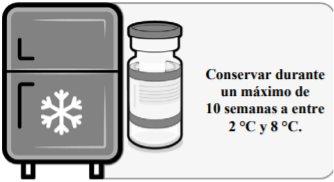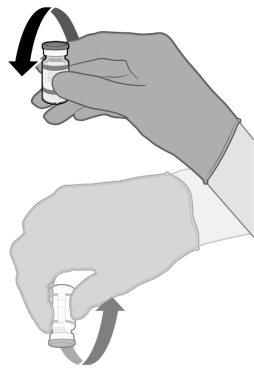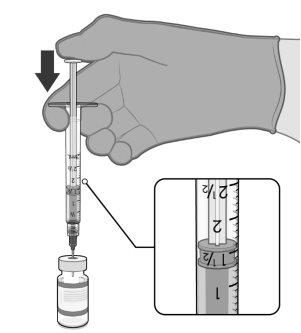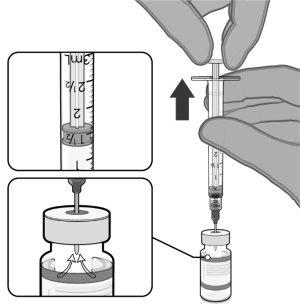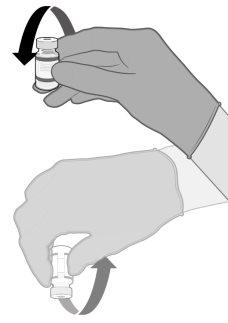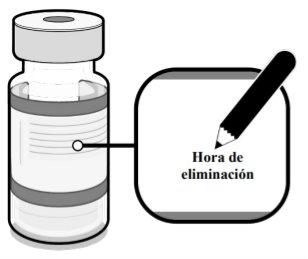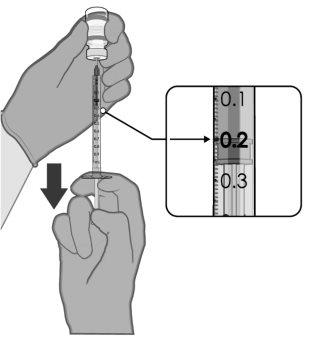
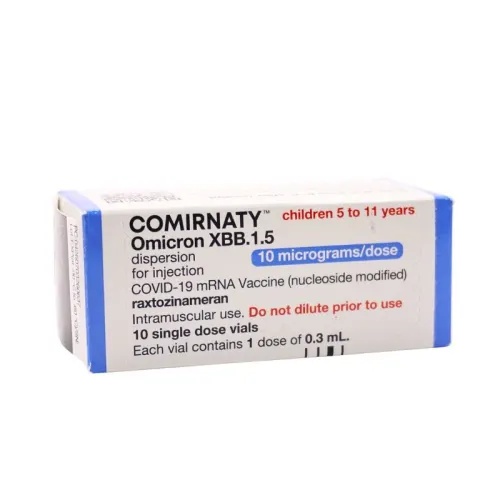
COMIRNATY 10 micrograms/dose injectable dispersion concentrate

Ask a doctor about a prescription for COMIRNATY 10 micrograms/dose injectable dispersion concentrate

How to use COMIRNATY 10 micrograms/dose injectable dispersion concentrate
Introduction
Package Leaflet: Information for the User
Comirnaty 10 micrograms/dose concentrate for dispersion for injection
Children from 5 to 11 years of age
COVID-19 mRNA vaccine (with modified nucleosides)
tozinameran
This medicine is subject to additional monitoring, which will allow for quicker identification of new safety information. You can help by reporting any side effects your child may get. The last part of section 4 tells you how to report side effects.
Read all of this leaflet carefully before your child receives this vaccine, because it contains important information for them.
- Keep this leaflet, you may need to read it again.
- If you have any further questions, ask your doctor, pharmacist, or nurse.
- If your child gets any side effects, talk to your doctor, pharmacist, or nurse. This includes any possible side effects not listed in this leaflet. See section 4.
Contents of the pack
- What is Comirnaty and what is it used for
- What you need to know before your child starts receiving Comirnaty
- How Comirnaty is administered
- Possible side effects
- Storage of Comirnaty
- Contents of the pack and further information
1. What is Comirnaty and what is it used for
Comirnaty is a vaccine used to prevent COVID-19 caused by the SARS-CoV-2 virus.
Comirnaty 10 micrograms/dose concentrate for dispersion for injection is administered to children from 5 to 11 years of age.
The vaccine makes the immune system (the body's natural defenses) produce antibodies and blood cells that fight the virus, providing protection against COVID-19.
Because Comirnaty does not contain the virus to produce immunity, it cannot give your child COVID-19.
2. What you need to know before your child starts receiving Comirnaty
Comirnaty must not be administered
- if your child is allergic to the active substance or to any of the other ingredients of this medicine (listed in section 6).
Warnings and precautions
Talk to your doctor, pharmacist, or nurse before your child receives the vaccine if your child:
- has ever had a severe allergic reaction or breathing problems after injection of any other vaccine or after being given Comirnaty in the past;
- is nervous about the vaccination process or has fainted after an injection with a needle;
- has a severe illness or infection with high fever. However, your child can be vaccinated if they have a mild fever or an upper respiratory tract infection such as a cold;
- has a bleeding disorder, bruises easily, or is taking a medicine to prevent blood clotting;
- has a weakened immune system due to a disease such as HIV or due to medication, such as corticosteroids, that affect the immune system.
There is an increased risk of myocarditis (inflammation of the heart muscle) and pericarditis (inflammation of the outer lining of the heart) after vaccination with Comirnaty (see section 4). These disorders can occur within a few days of vaccination and have mainly occurred within 14 days. They have been observed more frequently after the second dose of the vaccination and more frequently in young males. The risk of myocarditis and pericarditis appears to be lower in children from 5 to 11 years of age than in those from 12 to 17 years of age. After vaccination, you should be alert to the signs of myocarditis and pericarditis, such as difficulty breathing, palpitations, and chest pain, and seek immediate medical attention if they occur.
As with any vaccine, Comirnaty may not fully protect all people who receive it and it is not known how long you will be protected.
Your child may receive a third dose of Comirnaty. The efficacy of Comirnaty, even after a third dose, may be lower in immunocompromised individuals. In these cases, they should continue to maintain physical precautions to help prevent COVID-19. Additionally, their close contacts should be vaccinated as appropriate. Discuss individual recommendations with your doctor.
Children
A pediatric presentation is available for infants and children from 6 months to 4 years of age. For more information, see the package leaflet for Comirnaty 3 micrograms/dose concentrate for dispersion for injection.
Comirnaty is not recommended for use in infants under 6 months of age.
Other medicines and Comirnaty
Tell your doctor or pharmacist if your child is using, has recently used, or might use any other medicines or has recently received any other vaccine.
Pregnancy and breastfeeding
If your daughter is pregnant, inform your doctor, nurse, or pharmacist before your daughter receives this vaccine.
Comirnaty can be used during pregnancy. A large amount of information on pregnant women vaccinated with Comirnaty during the second and third trimesters has not shown adverse effects on pregnancy or the newborn. Although information on the effects on pregnancy or the newborn after vaccination during the first trimester is limited, no change in the risk of spontaneous abortion has been observed.
Comirnaty can be used during breastfeeding.
Driving and using machines
Some of the effects of vaccination mentioned in section 4 (Possible side effects) may temporarily affect the ability to use machines or perform activities such as cycling. Wait until these effects have disappeared before resuming activities that require your full attention.
3. How Comirnaty is administered
Comirnaty is administered after dilution as an injection of 0.2 ml into a muscle of the arm.
Your child will receive two injections.
A second dose of the same vaccine is recommended 3 weeks after the first dose to complete the vaccination schedule.
If your child is immunocompromised, they may receive a third dose of Comirnaty at least 28 days after the second dose.
If a child turns 12 years of age between their two doses of the primary vaccination schedule, they should complete the schedule with the same dose level of 10 micrograms.
A booster dose of Comirnaty can be administered at least 6 months after the primary vaccination schedule in children from 5 to 11 years of age.
If you have any further questions on the use of Comirnaty, ask your doctor, pharmacist, or nurse.
4. Possible side effects
Like all vaccines, Comirnaty can cause side effects, although not everybody gets them.
Very common side effects:may affect more than 1 in 10 people
- injection site: pain, swelling
- fatigue
- headache
- muscle pain
- chills
- joint pain
- diarrhea
- fever
Common side effects:may affect up to 1 in 10 people
- nausea
- vomiting
- redness at the injection site («very common» in children from 5 to 11 years of age)
Uncommon side effects:may affect up to 1 in 100 people
- enlarged lymph nodes (more frequently observed after the booster dose)
- malaise
- arm pain
- insomnia
- itching at the injection site
- allergic reactions such as skin rash or itching
- feeling weak or lack of energy/drowsiness
- decreased appetite
- dizziness
- excessive sweating
- night sweats
Rare side effects:may affect up to 1 in 1,000 people
- temporary paralysis of one side of the face
- allergic reactions such as hives or swelling of the face
Very rare side effects:may affect up to 1 in 10,000 people
- inflammation of the heart muscle (myocarditis) or inflammation of the outer lining of the heart (pericarditis) which can lead to difficulty breathing, palpitations, or chest pain
Frequency not known(cannot be estimated from the available data)
- severe allergic reaction
- extensive swelling of the limb in which the vaccine was administered
- swelling of the face (swelling of the face may occur in patients who have received dermal filler injections)
- a skin reaction that causes red spots or patches on the skin, which may look like a target or a «bull's eye» with a dark red center surrounded by lighter red rings (erythema multiforme)
- abnormal sensation in the skin, such as tingling or prickling (paresthesia)
- decreased sensitivity, especially in the skin (hypoesthesia)
- heavy menstrual bleeding (most cases do not appear to be serious and are temporary)
Reporting of side effects
If your child experiences any side effects, talk to your doctor, pharmacist, or nurse, even if it is possible side effects not listed in this leaflet. You can also report side effects directly via the national reporting system listed in Appendix V and include the batch number if known. By reporting side effects, you can help provide more information on the safety of this medicine.
5. Storage of Comirnaty
Keep this medicine out of the sight and reach of children.
The following information on storage, expiry, and use and handling is intended for healthcare professionals.
Do not use this medicine after the expiry date which is stated on the carton and on the label after EXP. The expiry date is the last day of the month shown.
Store in a freezer at –90 °C to –60 °C.
Store in the original package to protect from light.
The vaccine is received frozen at –90 °C to –60 °C. The frozen vaccine can be stored at –90 °C to –60 °C or at 2 °C to 8 °C after receipt.
If stored frozen at –90 °C to –60 °C, the vaccine packs of 10 vials can be thawed at 2 °C to 8 °C for 4 hours or individual vials can be thawed at room temperature (up to 30 °C) for 30 minutes.
Once removed from the freezer, the unopened vial can be stored and transported refrigerated at 2 °C to 8 °C for a maximum of 10 weeks; do not exceed the expiry date printed (EXP). The outer packaging should be marked with the new expiry date at 2 °C to 8 °C. Once thawed, the vaccine cannot be re-frozen.
Before use, unopened vials can be stored for a maximum of 12 hours at temperatures between 8 °C and 30 °C.
Thawed vials can be handled in ambient light conditions.
After dilution, store the vaccine at 2 °C to 30 °C and use within 12 hours, which includes a transport time of up to 6 hours. Discard unused vaccine.
Do not use this vaccine if you notice visible particles in the dilution or a change in color.
Medicines should not be disposed of via wastewater or household waste. Ask your pharmacist how to dispose of medicines no longer required. This will help protect the environment.
6. Container Contents and Additional Information
Comirnaty Composition
- The active ingredient is a COVID-19 mRNA vaccine called tozinameran. After dilution, the vial contains 10 doses of 0.2 ml with 10 micrograms of tozinameran each.
- The other components are:
- ((4-hydroxybutyl)azanediyl)bis(hexane-6,1-diyl)bis(2-hexyldecanoate) (ALC-0315)
- 2-[(polyethylene glycol)-2000]-N,N-ditetradecylacetamide (ALC-0159)
- 1,2-distearoyl-sn-glycero-3-phosphocholine (DSPC)
- cholesterol
- tromethamine
- hydrochloric acid
- sucrose
- water for injectable preparations
Product Appearance and Container Contents
The vaccine is a dispersion (pH: 6.9-7.9) of white to off-white color, presented in a 10-dose multidose vial, transparent (Type I glass), 2 ml, with a rubber stopper and a plastic flip-offcap, orange in color, with an aluminum seal.
Container sizes: 10 vials or 195 vials
Only certain container sizes may be marketed.
Marketing Authorization Holder
BioNTech Manufacturing GmbH
An der Goldgrube 12
55131 Mainz
Germany
Phone: +49 6131 9084-0
Fax: +49 6131 9084-2121
Manufacturers
BioNTech Manufacturing GmbH
Kupferbergterrasse 17-19
55116 Mainz
Germany
Pfizer Manufacturing Belgium NV
Rijksweg 12
2870 Puurs
Belgium
For further information on this medicinal product, please contact the local representative of the marketing authorization holder.
België/Belgique/Belgien Luxembourg/Luxemburg Pfizer S.A./N.V. Tel: +32 (0)2 554 62 11 | Lietuva Pfizer Luxembourg SARL filialas Lietuvoje Tel: +370 52 51 4000 |
| Magyarország Pfizer Kft Tel: +36 1 488 3700 |
Ceská republika Pfizer, spol. s r.o. Tel: +420 283 004 111 | Malta Vivian Corporation Ltd. Tel: +35621 344610 |
Danmark Pfizer ApS Tlf: +45 44 201 100 | Norge Pfizer AS Tlf: +47 67 526 100 |
Deutschland BioNTech Manufacturing GmbH Tel: +49 6131 90840 | Nederland Pfizer BV Tel: +31 (0)10 406 43 01 |
Eesti Pfizer Luxembourg SARL Eesti filiaal Tel: +372 666 7500 | Österreich Pfizer Corporation Austria Ges.m.b.H Tel: +43 (0)1 521 15-0 |
Ελλάδα Pfizer Ελλάς A.E. Τηλ.: +30 210 6785 800 | Polska Pfizer Polska Sp. z o.o. Tel.: +48 22 335 61 00 |
España Pfizer, S.L. Tel: +34 914 909 900 | Portugal Laboratórios Pfizer, Lda. Tel: +351 21 423 5500 |
France Pfizer Tél +33 1 58 07 34 40 | România Pfizer Romania S.R.L Tel: +40 (0) 21 207 28 00 |
Hrvatska Pfizer Croatia d.o.o. Tel: +385 1 3908 777 | Slovenija Pfizer Luxembourg SARL Pfizer, podruznica za svetovanje s podrocja farmacevtske dejavnosti, Ljubljana Tel.: +386 (0) 1 52 11 400 |
Ireland Pfizer Healthcare Ireland Tel: 1800 633 363 (toll free) +44 (0)1304 616161 | Slovenská republika Pfizer Luxembourg SARL, Organizacná zložka Tel: +421 2 3355 5500 |
Ísland Icepharma hf Simi: +354 540 8000 | Suomi/Finland Pfizer Oy Puh/Tel: +358 (0)9 430 040 |
Italia Pfizer S.r.l. Tel: +39 06 33 18 21 | Sverige Pfizer AB Tel: +46 (0)8 550 520 00 |
Κύπρος Pfizer Ελλάς Α.Ε. (Cyprus Branch) Τηλ: +357 22 817690 | United Kingdom (Northern Ireland) Pfizer Limited Tel: +44 (0) 1304 616161 |
Latvija Pfizer Luxembourg SARL filiale Latvija Tel.: +371 670 35 775 |
Date of Last Revision of this Leaflet:
Scan the code with a mobile device to obtain the leaflet in different languages.

URL: www.comirnatyglobal.com
Detailed information on this medicinal product is available on the European Medicines Agency website: http://www.ema.europa.eu.
The leaflet can be found in all languages of the European Union/European Economic Area on the European Medicines Agency website.
This information is intended for healthcare professionals only:
Administer Comirnaty intramuscularly after dilution in a 2-dose schedule (0.2 ml each) with a 3-week interval.
A Comirnaty booster dose may be administered at least 6 months after the primary vaccination schedule in children aged 5 to 11 years.
A third dose may be administered at least 28 days after the second dose in individuals who are severely immunocompromised.
Traceability
In order to improve the traceability of biological medicinal products, the name and batch number of the administered product must be clearly recorded.
Handling Instructions
Comirnaty 10 micrograms/dose must be prepared by a healthcare professional using aseptic technique to ensure the sterility of the prepared dispersion.
VERIFICATION OF COMIRNATY 10 MICROGRAMS/DOSE CONCENTRATE FOR INJECTABLE DISPERSION (CHILDREN 5 TO 11 YEARS OF AGE) | |
|
|
HANDLING BEFORE USE OF COMIRNATY 10 MICROGRAMS/DOSE CONCENTRATE FOR INJECTABLE DISPERSION (CHILDREN 5 TO 11 YEARS OF AGE) | |
|
|
MIXING BEFORE DILUTION OF COMIRNATY 10 MICROGRAMS/DOSE CONCENTRATE FOR INJECTABLE DISPERSION (CHILDREN 5 TO 11 YEARS OF AGE) | |
Gently 10 times |
|
DILUTION OF COMIRNATY 10 MICROGRAMS/DOSE CONCENTRATE FOR INJECTABLE DISPERSION (CHILDREN 5 TO 11 YEARS OF AGE) | |
1.3 ml of a 9 mg/ml (0.9%) sodium chloride injectable solution |
|
Draw the plunger to 1.3 ml to extract air from the vial. |
|
Gently 10 times |
|
Record the date and time as appropriate. Use within 12 hours after dilution. |
|
PREPARATION OF INDIVIDUAL 0.2 ML DOSES OF COMIRNATY 10 MICROGRAMS/DOSE CONCENTRATE FOR INJECTABLE DISPERSION (CHILDREN 5 TO 11 YEARS OF AGE) | |
0.2 ml of diluted vaccine |
To extract 10 doses from the same vial, syringes and/or needles with a low dead volume should be used. The combination of syringe and needle with a low dead volume should have a dead volume of 35 microliters or less. If conventional syringes and needles are used, there may not be sufficient volume to extract 10 doses from the same vial.
used within 12 hours after dilution. |
Disposal
Disposal of unused medicinal products and all materials that have come into contact with them should be carried out in accordance with local regulations.
- Country of registration
- Active substance
- Prescription requiredYes
- Manufacturer
- This information is for reference only and does not constitute medical advice. Always consult a licensed doctor before taking any medication. Oladoctor is not responsible for medical decisions based on this content.
- Alternatives to COMIRNATY 10 micrograms/dose injectable dispersion concentrateDosage form: INJECTABLE, 0.2 mLActive substance: covid-19, RNA-based vaccineManufacturer: Biontech Manufacturing GmbhPrescription requiredDosage form: INJECTABLE, 0.3 micrograms/0.3 mlActive substance: covid-19, RNA-based vaccineManufacturer: Biontech Manufacturing GmbhPrescription requiredDosage form: INJECTABLE, 10 microgramsActive substance: covid-19, RNA-based vaccineManufacturer: Biontech Manufacturing GmbhPrescription required
Online doctors for COMIRNATY 10 micrograms/dose injectable dispersion concentrate
Discuss dosage, side effects, interactions, contraindications, and prescription renewal for COMIRNATY 10 micrograms/dose injectable dispersion concentrate – subject to medical assessment and local rules.





